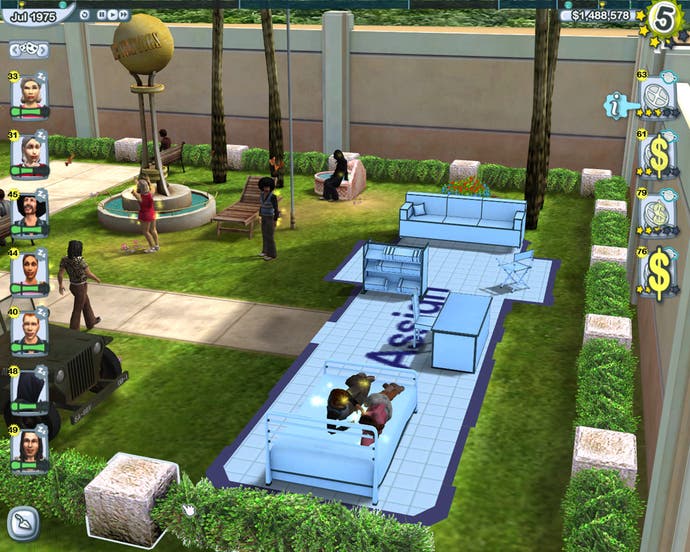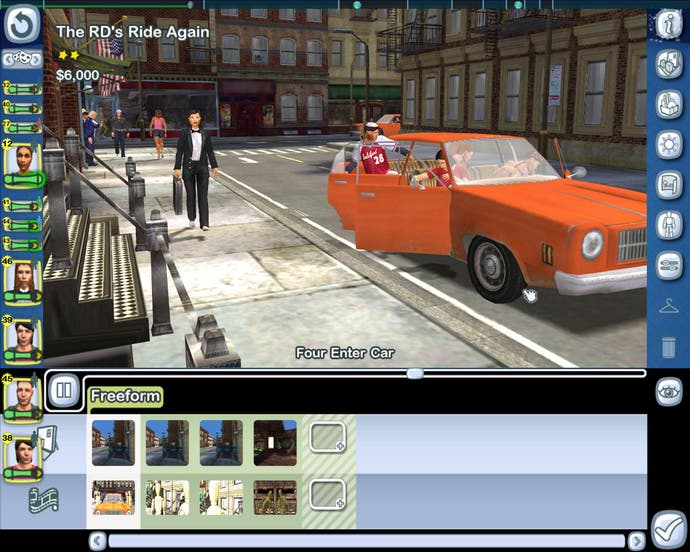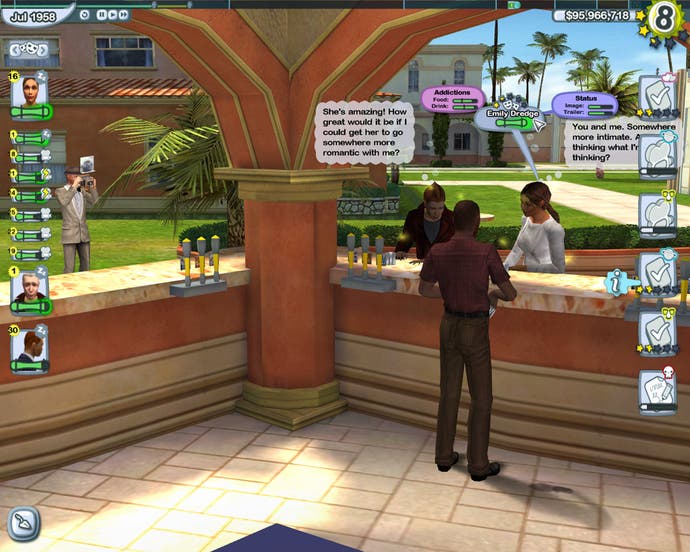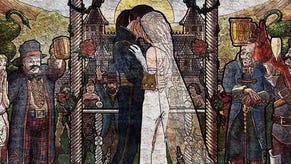The Movies
"I like to Movies, movies" - The Mad Stuntman, mishearing.
It is, it has to be said, a killer idea.
You're in charge of a major Hollywood movie studio. You hire the stars. You choose the movies to make. You order the research and try and keep everyone happy. And when you've completed a film, a fully watchable mini-featurette pops out the other end. Get more involved and you actually script the films yourself. It allows you to reach out, tear down the silver screen and wear it as a resplendent cloak in your heroic fantasy as a genuine auteur. It's a good idea - one of the best to come from the Bullfrog lineage of good ideas.
But, as a management game, something grates.
Not all though. Elements are great - the regular Oscars-styled ceremony where all the different companies compete in their performance. Is your film best? If so, reap the rewards of kudos and an always welcome bonus-ability. The interface at the base level is incredibly accessible. Instead of hiding everything in tiny sub-menus, you give orders to characters by picking them up and moving them where you want to be. Want a mechanic to fix a set? Pick 'em and drop them on the repair icon. Want them to move it? The 'move' icon is what you'll desire, sir. Destroy it? The... oh, you get the point. A trail of stardust from whoever you pick up also hints at where the game thinks you'll be wanting to take it, which helps mitigates against the system's most obvious problem (i.e. When your lot is large, there's a lot of scrolling required to give orders). It looks great. There's a real sense of humour to it all, often of the gleeful toilet variety. You wouldn't get the more serious American developers having an icon inform you when a superstar was off to "curl one out".

After some thought, I'd argue that the problem with The Movies as a management game is one of abstraction. It's clearly in the lineage of Theme Park, with you managing a single large lot where you build sets to shoot on, production facilities, places for your stars to live and all manner of decorative artefacts to make sure that your studio is the most prestigious. The problem is that while these staples of the management game make perfect sense for running any form of business which is directly entertaining the public (i.e. a Theme Park or similar), it doesn't really seem to ring true when it's essentially a manufacturing business.
Or, in short, with some tasks, you'll find yourself wandering why on earth you're actually doing it. A good example? Litter bins. Why, as a classic movie mogul, are you worrying about whether you've got enough litter bins or not? When they set up Dreamworks, I'm sure they didn't get Spielberg to wander around their offices making sure that no-one was going to drop litter on the floor.
Similarly, areas you'd have expected they'd pay plenty of attention are oddly under-developed. Take the nature of star-based relationships, for example. All your actors have opinions of each other. The higher they are when you're making a film, the better it'll be - or at least it'll be one of the many influencing factors. Relationships are improved by having stars talk to each other, by dropping them beside each other. Keep this long enough up, and they'll become increasingly close friends, but oddities abound. While making a star drink alone in a bar is a good thing for their mood (and bad for alcoholism rating), if you make them drink with another star they'll be unhappy unless they've already become properly familiar. As their relationships become increasingly close, they'll only be happy talking in increasingly baroque settings - which means you have to manually move each couple from the bar to the VIP bar to the restaurant to the VIP restaurant depending at which stage they're closest. And it takes forever. I'd only managed to have a couple of significant friendships cultivated by 1970, with everyone else refusing to talk to each other except in public on the streets.

It's just not right. People are more likely to talk nonsense in bars and become friends than randomly in the street. No, really. Come to a bar in Bath tonight and watch me. You'll have all the evidence you'll ever need.
Your remake of Gone With The Wind has gone hugely over-budget, your Scarlet O'Hara is having screaming arguments with an alcoholic Brett and the press are threatening an expose that Brett actually has a secret gay lover... That's what you expect, and it's exactly what you don't get. You're left with a decent enough management game, but hardly an inspiring one. You can't help but wish Lionhead had taken more from the Sims (to get more of the people interactions) or a harder business management game (to get the sense of deal-making) rather than recapitulating what it was familiar with.
Except, you begin to suspect, it had to do it this way. Yes, the Theme-Park model isn't ideal, but Lionhead needed a sturdy base to grow its innovations from. Trying to do a more radical sims/management game hybrid as well as the machinima-movie-making aspects would have been too much for any developer, and lead to a confused mess of a game. If that's true, Lionhead's decision was the right one. The Movies isn't as good a game as we may have hoped, but if the cost of having an elaborate, expressive film-making tool in the game is the relatively rude soil of the management game, then it was well worth it.
In other words, The Movies is all about the movies.
While a screenwriting office can generate movies to keep your organisation ticking over, you'll be wanting to get hands on and dirty with the tools where you select from the sets you've constructed, what action scenes, what actors, costume and sets. Extras? If so, how many? Special effects or weather? It walks a fine line between being accessible enough to let anyone make a little film, and free enough to make the film satisfactorily yours. As with all machinima ever, comedy tends to play out better than any attempt at serious drama, but some horror and disturbing effects can come out surprisingly well.

But is it pointless in the game? Well, not completely pointless. In my experience, the movies which I hand-crafted got better ratings than those which the computer writers just churned out; but for the amount of effort you put in, you'd hope so. However, it's deeply pleasurable. To take a parallel, it was easy enough to "game" the Sims and arrange your house in unrealistic fashions which allowed your Sims to live incredibly efficient lives. However, in practice, what was fun was treating it as a doll's house, and getting stuck into deciding which wallpaper was really you. The same is true here. There's no point but your smile, and - for me - that's all the point a game ever needs.
The post-production facility allows you to really elaborate the films to show people: import music, add sound-effects or captions, and - for those with a microphone - you can even do a live voice-over and have the character auto-lip-sync. And when you're all done, you can export your movie to show your friends or upload to the actual Movies site. Naturally enough, that's taken off already. Hell - I'm already starring in a deeply libellous one.. I liked Fable, you basts.
As a pure management game, I'd mark either one or two marks beneath this. But it's not a pure management game; it's something else, all of its own, and for bringing a slice of the magic of the movies to the monitor screen, it deserves our respect. Not quite a star set in cement on an LA sidewalk, but definitely far above the singer/actress/model-working-between-jobs-in-a-bargain-diner.




